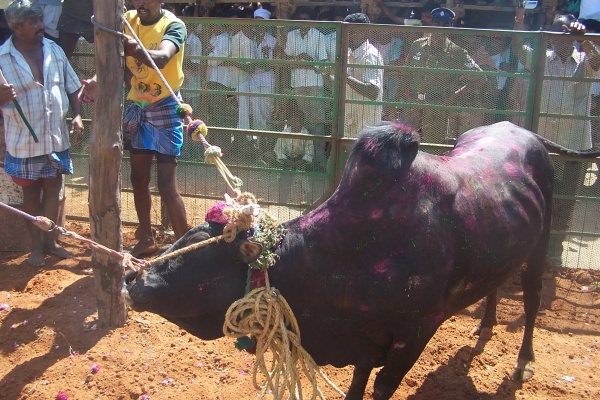It is a crime to hurt wildlife in any way in India – with serious punishments attached to any cruelty to wildlife. However, in case of domestic animals it is quite another thing. There is a law – but the punishment prescribed in it is so ludicrous that no one even bothers to implement it. However, Supreme Court has now used this law to ban a festival globally criticised for animal cruelty, and has laid down some really important findings. Anupam from RMLNLU, Lucknow writes about the Jalilkattu judgment.

The Supreme Court on Wednesday gave a judgement banning the sport of Jallikattu (bull racing) which is majorly practised in the states of Tamil Nadu and Maharashtra. It is a key part of the rice harvest festival of Pongal in villages in southern India every January. Some foreign tourists travel to India to watch and take part in the spectacle. Unlike the famous bull running in Pamplona, Spain where participants leap out of the path of the bulls as they thunder by, the Indian participants have to hang on to the bulls. If a man manages to stay on top of the bull for a certain distance he can win prizes.
Jallikattu is a Tamil word which comes from the term “Callikattu”, where “Calli” means coins and “Kattu” means a package. Jallikattu refers to silver or gold coins tied on the bulls’ horns. People, in the earlier time, used to fight to get at the money placed around the bulls’ horns which depicted as an act of bravery. Later, it became a sport conducted for entertainment and was called “Yeruthu Kattu”, in which a fast moving bull was corralled with ropes around its neck. Started as a simple act of bravery, later, assumed different forms and shapes like Jallikattu (in the present form), Bull Race etc., which is based on the concept of flight or fight.
The case in the SC was a culmination of an appeal by Animal Welfare Board of India (AWBI), a statutory Board, established under Section 4 of the Prevention of Cruelty to Animals Act, 1960 (PCA) challenging Madras High Court’s 2007 verdict which allowed bullfights and a petition by PETA challenging the validity of Tamil Nadu Regulation of Jallikattu Act, 2009 (TNRJ). TNRJ was enacted in 2011 with a purpose to regulate the conduct of Jallikattu.
The organisers argued that this practice is going on for last more than 300 years by way of custom and tradition and it also helps the state generate revenue. The state of Tamil Nadu told the court that it shall make every effort to see bulls are not subjected to cruelty and argued that the sport can be regulated by the TNRJ Act. The SC remarked that TNRJ Act is an anthropocentric legislation enacted not for the welfare of the animals but to safeguard the interests of organisers and spectators.
The court also observed that the state of Maharashtra has not challenged an earlier Bombay High Court judgement which banned exhibition and training of bulls and thus concluded that it is in favour of banning this sport.
The Ministry of Environment and Forests in 1991 via a notification had banned the training and exhibition of bears, monkeys, tigers and panthers. In 2011 by another notification it included bulls to the list.
AWBI brought the court’s notice towards the ill treatment meted out to the bulls involved in the sport. Through multiple affidavits AWBI stated that organisers cut the bulls ears, poke them with sharp objects, use irritants and force them to drink liquor in order to anger the bulls. During the fights the bulls tail which consists of 20 small bones and is an extension of their spinal cord and vertebral column is dislocated or amputated. This leads to physiological, neuroendocrine and behavioural changes in the animal. The SC strongly remarked that ancient culture and tradition don’t support the conduct of Jallikattu in the form they are being conducted at present. The court remarked that bulls adopt fight response when they are frightened or threatened and this is what is being exploited by the organisers of Jallikattu.
The SC expressed anguish at the lack of international agreements that ensures the welfare and protection of animals. It classified the evolution of International law on animal rights into three stages.
- Human self-interest as a reason for environmental protection.
- International equity to meet the needs of future generations
- Nature’s own rights where recent international instruments have asserted the intrinsic value of nature.
The court took cue from German constitution that obliges state to respect animal dignity. It also observed that Switzerland, Austria and Slovenia have enacted legislation to include animal welfare in their national constitution. It advanced the guidelines of the World Health Organisation of Animal Health, still known by its French acronym (OIE) that talks of five freedoms for animals to be “healthy, comfortable, well-nourished, safe and free from pain, fear and distress.” These are:
i) Freedom from hunger, thirst and malnutrition;
ii) Freedom from fear and distress;
iii) Freedom from physical and thermal discomfort;
iv) Freedom from pain, injury and disease; and
v) Freedom to express normal patterns of behaviour.
The Apex Court said it was dealing with “an issue of seminal importance with regard to the rights of animals under our Constitution, laws, culture, tradition, religion and ethology” and went on to strike down the Tamil Nadu Regulation of Jallikattu Act, 2009 on the grounds that it was “constitutionally void” for violating Article 254(1), and asked the Centre to amend the provisions of the PCA Act that prevents cruelty to animals to bring bulls in its ambit. The bench comprised of Justice K.S. Radhakrishnan and Justice Pinaki Chandra Ghose.
 Serato DJ Crack 2025Serato DJ PRO Crack
Serato DJ Crack 2025Serato DJ PRO Crack








 Allow notifications
Allow notifications


